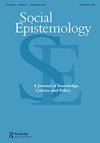Towards a Clear and Fair Conceptualization of Empathy
IF 2
2区 哲学
Q1 HISTORY & PHILOSOPHY OF SCIENCE
引用次数: 0
Abstract
ABSTRACT Empathy is operationalised and measured in various different ways in research. I have identified several trends in empathy research that have resulted in what I refer to as neurotypical gatekeeping of the concept of empathy. Narrow assumptions on the relationship between experiences and expressions have made the concept exclusive to those who are perceived as neurotypical. In several ways, this has biased our knowledge of empathy, especially regarding autism. This does not only invalidate autistic empathy, but also sustains a harmful and stigmatizing narrative of autism. In this paper, I expand on the neurotypical gatekeeping of empathy as a matter of epistemic injustice and argue why and how neurodiversity calls for a reconceptualization of empathy. I continue by building a proposal for a clear and fair notion of empathy. I argue that we need to settle the dispute on empathy and morality by accepting the value associated with empathy in society, and use an anti-discriminatory normative conceptualization accordingly. I propose to understand empathy as appropriately attending to experiential differences and similarities, balancing between – what I introduce as - distantism and proximism. I discuss conceptual and methodological implications of this approach to empathy, as well as its application to neurodiversity.走向一个清晰而公平的移情概念
在研究中,共情以各种不同的方式进行操作和测量。我已经确定了移情研究中的几个趋势,这些趋势导致了我所说的移情概念的神经典型把关。对经验和表达之间关系的狭隘假设使得这个概念只适用于那些被认为是神经典型的人。在很多方面,这让我们对同理心的认识产生了偏差,尤其是在自闭症方面。这不仅使自闭症患者的同情心无效,而且还维持了对自闭症的有害和污名化的叙述。在本文中,我将移情的神经典型把关作为认知不公正的问题进行了扩展,并讨论了神经多样性为什么以及如何要求重新概念化移情。我继续提出一个关于同理心的清晰而公平的概念。我认为,我们需要通过接受社会中与同理心相关的价值来解决同理心和道德的争议,并相应地使用反歧视的规范性概念。我建议将共情理解为对经验差异和相似之处的适当关注,在我所引入的距离主义和接近主义之间取得平衡。我将讨论这种移情方法的概念和方法含义,以及它在神经多样性中的应用。
本文章由计算机程序翻译,如有差异,请以英文原文为准。
求助全文
约1分钟内获得全文
求助全文
来源期刊

Social Epistemology
Multiple-
CiteScore
2.60
自引率
17.60%
发文量
60
期刊介绍:
Social Epistemology provides a forum for philosophical and social scientific enquiry that incorporates the work of scholars from a variety of disciplines who share a concern with the production, assessment and validation of knowledge. The journal covers both empirical research into the origination and transmission of knowledge and normative considerations which arise as such research is implemented, serving as a guide for directing contemporary knowledge enterprises. Social Epistemology publishes "exchanges" which are the collective product of several contributors and take the form of critical syntheses, open peer commentaries interviews, applications, provocations, reviews and responses
 求助内容:
求助内容: 应助结果提醒方式:
应助结果提醒方式:


